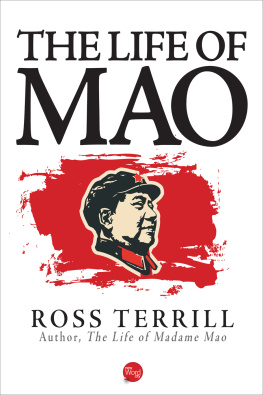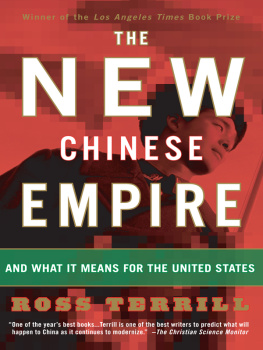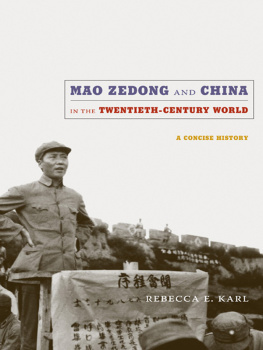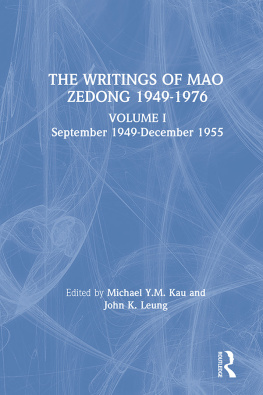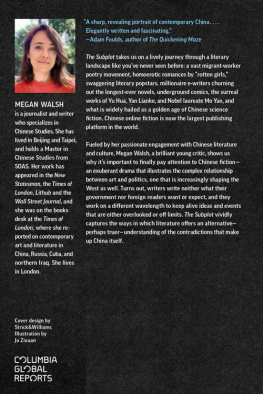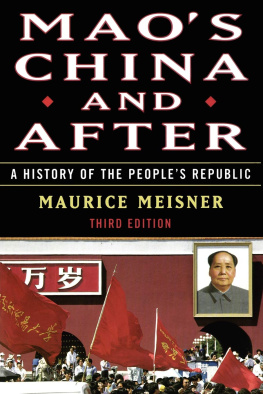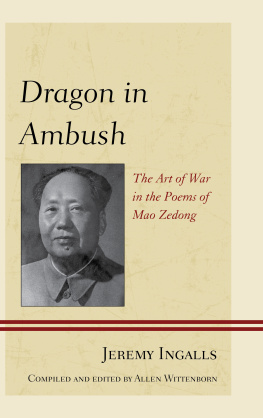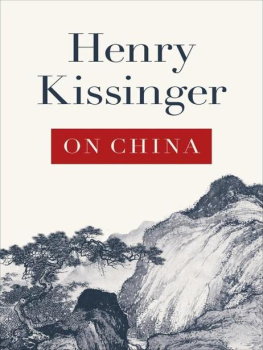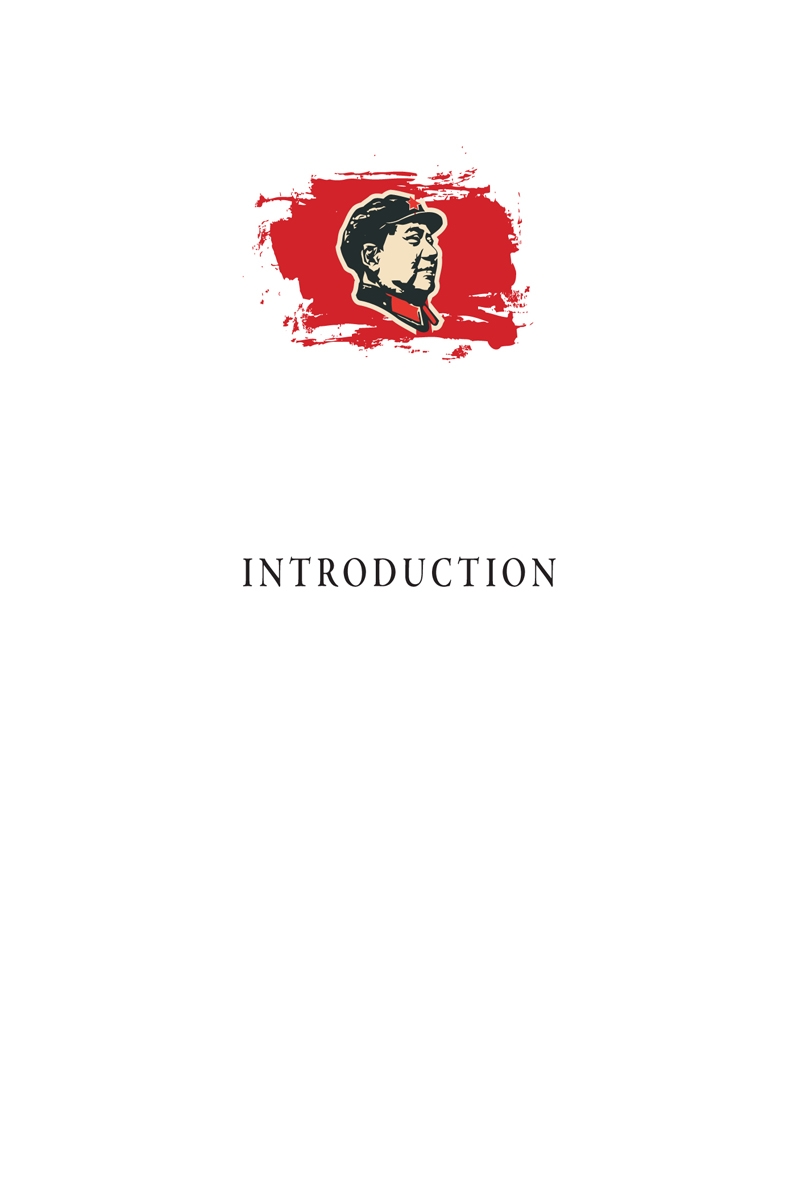Compared with the first edition two decades ago, the chapters that follow do not change my overall picture of Mao. Today I stress a little more than before that Mao from the late 1950s on had recurrent doubts about what the revolution had accomplished and began to turn back to a subjective worldview and a cyclical idea of history. Also, he really did fear that capitalism might well be restored in China. Newly available Mao texts from the period of the Hundred Flowers and the Great Leap Forward confirm my original contention that Mao became idiosyncratic and subjective from this time onward. In fact, Mao the tiger and Mao the monkey, a motif of the book, are simultaneously in evidence in the 1956-57 talks and diatribes. Mao was both carrying his zeal for social engineering a step further and expressing doubts about some colleagues and some socialist orthodoxies.
It is clearer now that Mao didnt really lose power in the early 1960s and regain it by the Cultural Revolution. His own will to take a back seat and then spring to the fore again may have been as important as the power and policy struggles of that era. Jiang Qings role in the coming of the Cultural Revolution was greater than I allowed for in the first edition. Maos turning to her was integral to his personal resurgence and his fight against the threatening mortality of his revolution (as, indeed, his tilting toward her during 1976 was part of his final leftward lunge).
The picture of Mao and Jiang that emerges is not of a hero and a villain, but of two strong-willed people, with an unsymmetrical relation to Chinese public life, who were deeply in love with each other for a time, and who later transmuted the personal passion into a potent political marriage, but whose habits and tastes and abilities were wildly different, and who intermittently annoyed and bypassed each other. It is a disgrace to the Chinese Communist Party that the obituaries of Jiang Qing in the official press never mentioned that she had been married to Mao (for thirty-eight years!).
My original passages on Maos personal life were bolder than anything published on the mainland in the 1970s. Despite this head start, much more about Maos psychological relations with women, anguish at his own isolation, and other personal dimensions was revealed only after I finished Mao and began to research his wife in the early 1980s. For example, only in the Jiang Qing biography did I go into the large role in Maos last years of Zhang Yufeng, his confidential secretary.
I was criticized in reviews of the first edition for paying too much attention to Maos personality and personal life. Edwin Moise spoke for many when, in 1986 in the bibliography of his Modern China: A History, he recommended my Mao but warned his readers that it concentrates too much on details of Maos personal life. Yet a decade later, in a number of serious works, details of Maos personal life took center stage. Although my suggestion of the possibility of intimacy between Mao and Zhang Yufeng had been rejected, later revelations turned possibility into certainty.
I now give additional stress to Maos mixed record in judging people. Many top figures he ardently backed - Kang Sheng, Lin Biao, and Wang Hongwen, among others - were not in most respects good choices, just as he failed to back and retain many worthier figures - Peng Dehuai, Chen Yi, and Liu Shaoqi, among dozens of others. Maos conversation with Deng just after the latter fell and was being sent to the countryside in 1967 does not reflect well on Mao. Deng was bold enough to observe bitterly that perhaps he should have been like rising star Lin Biao and pleased Mao by making meritorious achievements out of nothing. To which Mao replied with a smile: History will judge whether Lin Biao is correct or not. You dont have to be defiant. A decade later Lin Biao was dead after a frightful clash with Mao, and Deng had begun his climb back to the top as the Mao of the post-Mao era.
The new research on the pre-1949 period has chipped away at the idea that most CCP successes were achieved by Mao single-handed. As for the post-Liberation period, Maos decision-making seems more ad hoc, even chaotic, than we used to think. Deciding to enter the Korean War, Mao was at the mercy of what Stalin permitted him to know of Kim Il-sungs plans to unify Korea, and faced colleagues deeply doubtful of the wisdom of China dancing to the deceptive tune of Kims ambitions and Stalins anti-American calculations. Mao practiced deviousness and deception in coping with political struggles and policy failures. His cool acquiescence in the destruction of Gao Gang, for example, may have been due less to Gaos ties to Moscow than to Maos wait-and-see ambivalence about Gaos maneuvers against a Liu Shaoqi of whom Mao was already wary. At times during the 1960s and 1970s, Maos taste for paradox, his self-criticism, and the alternating tiger and monkey sides to his own nature were all used to mislead or excuse. One minute he would dispatch Kang Sheng or Chen Boda to carry out a dirty trick, the next he would throw up his arms before a visitor and declare that he possessed no power at all.
We would not have guessed at Maos death in 1976, nor yet at the tenth anniversary of his death in 1986, that by the twentieth anniversary much of the focus on him would have shifted to his personal ways - to that most personal of all realms, his sexual life. But then Americans of the Reagan era in the 1980s might not have guessed that a U.S. president elected in 1992 would spend his first months in the White House on the issue of homosexuals in the military, the first weeks after his reelection in 1996 on the issue of sexual harassment in the military, and much of 1998 defending himself against charges about sexual misconduct in the White House.
As the turn of the century approached, Mao, indeed, was as often viewed as a conspirator and lecher as he was unifier of China, philosopher of Asian communism, and major architect of the collapse of the Communist bloc. A tendency to believe the best about Mao was one reason why Western Sinology was for some years disinclined to see the pathological in Mao. But a more important one was the absence of authoritative evidence of his willful and mindless ways. By the 1990s, the material base for viewing Maos methods of rule was much more extensive than during his lifetime. More than any other single work, it was The Private Life of Chairman Mao by Li Zhisui that consolidated this new perception in the West. Despite questions one might have about the reasons for Lis sourness toward Mao and the CCP, and about his recall of dialogue from decades before, the book by Maos former physician has the ring of authenticity. It is the only book we have by a close associate of Mao who defected from China and then told his story.
Lucian Pye points out that with great historical figures there are three levels of private-life relevance. On one level, the personal habits of the leader can be treated as just a tale of scandal, no more worth dwelling on than the gossip and crime pages of a newspaper. More interesting is the question of the consistency between the great figures private life and the values he upholds in public - and requires of his citizens. This is of some importance, especially to the citizens themselves; in China, tens of millions of people lost a decade or two of their private lives as Mao pursued his public phantoms. Most consequential of all is a third level, at which we explore the private man as a source of explanation for his public policies, an approach Pye took in his Mao Tse-tung: The Man in the Leader. This third level, of understanding Mao the man, seems to me of fundamental importance in gaining a total picture of Maos China, especially its last two decades.

